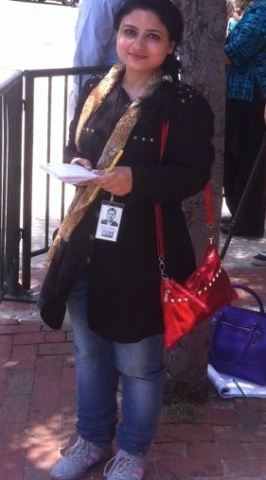
Pakistani journalist Mehwish Akram was extremely homesick when she first arrived in Richmond, Virginia for her media attachment as part of ICFJ's U.S.-Pakistan Professional Partnership in Journalism program. Yet, Akram says, "The nightmare changed into beautiful memories that I will cherish my whole life."
I believe I am a strong and confident girl who can adjust in any environment easily. But it is not always that easy.
I was very excited to visit the USA. I love traveling and was counting the days to be there. This was my first trip on an airplane as well as my first trip outside of my home country of Pakistan. I felt terrified because it was the first time I had to ride on an airplane. However, everything went much better than I imagined.
I reached Washington, D.C., and spent three days there with my other 19 fellows in ICFJ’s U.S.-Pakistan Professional Partnership in Journalism. I enjoyed it a lot. The real test began when we all had to leave for our placements in different states. Then, the whole scenario changed.
My trip to Richmond, VA, started with good train travel. I reached my hotel easily, but I was feeling lonely and depressed. Nobody was around. I felt like I was in prison. There was nobody to talk to, nobody with whom I could share my feelings.
I started feeling hungry, but had nothing to eat. The situation got worse. I started crying, missing my family. I felt like I would die of hunger and loneliness. Finally, I became so worn out that I fell asleep.
I contacted Elisa Tinsley, ICFJ’s Deputy Vice President of Programs, and Nolan Meyer, ICFJ’s Program Officer for the U.S.-Pakistan program, in D.C., and I asked them to call me. They encouraged me to give it a try and stay in Richmond for at least one more day to experience the WTVR-CBS 6 office.
The next morning, I joined the office. Everyone was welcoming, especially Sheryl and Robert. But I was still feeling depressed. I found an Indian restaurant next to the TV station. It was like rain in the desert. (You can see how terrible I felt at that time).
Things changed suddenly when I met my CNS-6 host Misti Davidson. I told her about my problems and she solved them one by one. She took me for groceries, we walked along the canal on the weekend and, best of all, we took a trip to Virginia Beach.
In the end, I spent 24 days with the CBS 6 team. I went out to report. I hung out with different journalists. I met many senior journalists from all over Virginia in Virginia Beach at the Virginia Association of Broadcasters’ summer convention.
Every day was exciting because I learned something new about American journalism and American culture. I had expected that Americans would know a lot about Pakistan and would ask me about the terrorism phenomena. Nothing like this happened.
I observed that Americans are welcoming, friendly, helpful and good listeners. I also learned that this society has freedom. If I was able to adjust to their environment, it was mainly because of their hospitality. The nightmare changed into beautiful memories that I will cherish my whole life. At first, it seemed horrible. Now, I already miss each and every moment, especially American breakfasts and meeting radio journalist Anne Booze.
I will never forget the time I spent in Richmond, working with Shelby Brown, Melissa, Cheryl, Chris Munnings… the list goes on and on.
At the end of the day, the most memorable people are not the ones with the most beautiful faces, but those with the most beautiful hearts and souls.